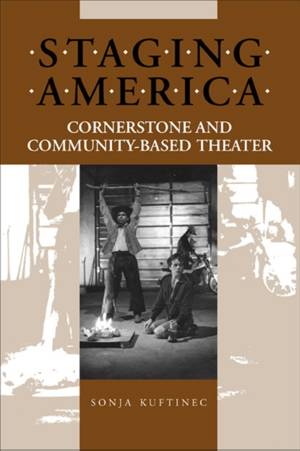
- Afhalen na 1 uur in een winkel met voorraad
- Gratis thuislevering in België vanaf € 30
- Ruim aanbod met 7 miljoen producten
- Afhalen na 1 uur in een winkel met voorraad
- Gratis thuislevering in België vanaf € 30
- Ruim aanbod met 7 miljoen producten
Omschrijving
This captivating studymaps a history and theory of community-based theater in the United States through the Cornerstone Theater Company. Detailing how the performance-making process contributes to an ongoing negotiation of American identity, Sonja Kuftinec investigates community-based theater to trace the historical affiliations of the form and critically examines how community-based theater both enables community and challenges the very notion of "community" as a stable site.
The process of making and unmaking community is vividly illuminated in the work of the Cornerstone Theater Company, a Los Angeles-based ensemble founded in 1986. From 1986 to 1991, Cornerstone toured nationwide, working mainly with rural towns to create adaptations of classical texts. A Wild West musical Hamlet was performed with residents of Marmarth, North Dakota (population 190), and The House on Walker River, an adaptation of the Oresteia trilogy, was developed with a Native American reservation in Nevada. Since 1991, Cornerstone has performed with urban communities, developing original shows and adaptations of Western and non-Western texts incorporating local histories and community players. These performances rearticulate distinctions among various urban group and between amateur and professional theater.
While Cornerstone's contemporary work can be contextualized within a historical tradition of grassroots performance, it also complicates this tradition, suggesting that identity may be more dynamic than rooted. By using Cornerstone as a case study, Kuftinec's analysis of community-based theater's impact upon rural, urban, and professional sites across the United States proposes that "community" and "America" are vital terms of negotiation rather than fixed entities.
Specificaties
Betrokkenen
- Auteur(s):
- Uitgeverij:
Inhoud
- Aantal bladzijden:
- 282
- Taal:
- Engels
- Reeks:
Eigenschappen
- Productcode (EAN):
- 9780809324972
- Verschijningsdatum:
- 22/04/2005
- Uitvoering:
- Paperback
- Formaat:
- Trade paperback (VS)
- Afmetingen:
- 155 mm x 229 mm
- Gewicht:
- 385 g

Alleen bij Standaard Boekhandel
Beoordelingen
We publiceren alleen reviews die voldoen aan de voorwaarden voor reviews. Bekijk onze voorwaarden voor reviews.











